FINANCE AND INVESTMENT
By CUSTOS
THE dismal course of stock markets this week has vindicated only too soon and too drastically the note of caution sounded here about industrial Ordinary shares. It was too much to expect that markets, already seriously disturbed by the evidence of growing competition in the export field, would stand up to the combined onslaught of labour troubles at home, the unpromising course of international politics in Paris and a fresh series of warnings by company chairmen of the coming fight for orders. So far as the average investor is concerned, the moral drawn from all this has been to postpone buying rather than cut losses on good shares. Selling has been light and the fall in prices has been brought about mainly by the lack of buying and some aggressive selling by Stock Exchange "bears."
It is tempting, of course, to argue that but for the " bears " prices would hold up. and everybody would be that much less depressed. I think that is fallacious reasoning. All that the " bears " bring about is a quicker readjustment of values to realities than would otherwise be the case. Their estimate of the future, like that of the " bulls " when markets are rising, may not always prove to be right. In times of depression the Stock Exchange is always apt to reflect errors of pessimism just as it invariably registers errors of optimism in times of boom.
INFLUENCE OF THE "BEARS" The truth remains that through the play upon 'prices of more or less well-informed buying and selling the Stock Exchange over a period is a fairly accurate barometer of business conditions. To return to my point: if the " bears " did not bring about a gradual fall in advance of actual events, such as lower profits and dividends, the inevitable adjustment in the market would take place suddenly when the news was acalally announced. That does, in fact, happen when shares are "marked down" by several shillings immediately after a piece of surprisingly bad company news.
'While I hold no brief for the " bears " or, for that matter, for the " bulls " as members of a well-ordered society, it is just as well that, as realists, we should recognise that their activities help to keep markets fluid. When markets are demoralised—not by the " bears " but by the business prospect—the only support often comes from the purchases which the " bears " have to make to cover their " short " sales. The market's progress towards a lower level is thus punctuated by temporary rallies, and investors wishing to sell are given an opportunity of getting out in reasonable dealing conditions.
TAKING THE LONG VIEW
What should the "average investor" do ? In my view he should refuse to be panicked by the fall in prices into jettisoning good shares but should make up his mind to see things through. The fall will almost certainly continue in the coming months to a point at which prices will reflect the errors of pessimism which are always made when investors' fears and the greed of the " bears " outrun reason. That will be time enough to consider fresh purchases. But what, may you ask, will justify a recovery in share values ? At this stage, when the horizon is so blurred, it is hard to say. My own feeling is that after the economic storm—which looms ahead—the outlook will improve and gradually change through the process of currency devaluation. The investment moral ? Hold on to shares in sound companies engaged in essential trades—and do not overlook the attractions of gold shares. I am less enamoured than I have recently been of the prospects for gilt-edged stocks.


































 Previous page
Previous page